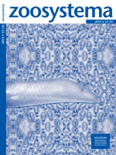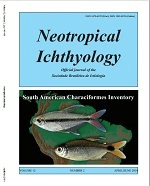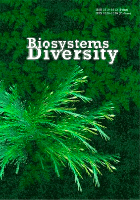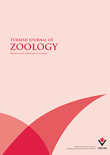
ANNALES ZOOLOGICI FENNICI
Scope & Guideline
Unlocking the Secrets of Animal Behavior and Systematics
Introduction
Aims and Scopes
- Biodiversity and Taxonomy:
The journal frequently publishes articles that describe new species and provide taxonomic revisions, especially within lesser-known groups of animals. This focus enhances our understanding of global biodiversity. - Ecology and Behavior:
Research on the ecological interactions and behavioral patterns of various animal species is a core area of interest. This includes studies on habitat preferences, reproductive behavior, and competition. - Conservation and Environmental Impact:
The journal addresses conservation issues and the impact of environmental changes on wildlife. This includes studies on species adaptation, habitat loss, and the effects of climate change. - Phylogenetics and Evolution:
Several publications delve into phylogenetic relationships among species, contributing to the understanding of evolutionary processes and species diversification. - Morphology and Physiology:
Research on the morphological and physiological traits of various taxa is highlighted, including studies on adaptations that facilitate survival in specific environments.
Trending and Emerging
- Molecular and Genetic Analyses:
There is a rising trend in the use of molecular techniques, such as transcriptome analysis and microsatellite studies, to understand genetic diversity and evolutionary relationships among species. - Impact of Climate Change on Wildlife:
Research addressing the effects of climate change on animal populations and ecosystems is increasingly prominent, highlighting the urgent need for conservation strategies in the face of global environmental shifts. - Invasive Species and Their Effects:
Studies investigating the impact of invasive species on native fauna are becoming more common, reflecting growing concerns about biodiversity loss and ecosystem integrity. - Community Ecology and Interactions:
Emerging research focuses on community dynamics and interspecific interactions, particularly in disturbed or changing environments, to better understand ecological resilience. - Behavioral Ecology and Adaptation:
There is an increasing emphasis on behavioral studies that explore how animals adapt to their environments, including reproductive strategies and foraging behaviors in response to ecological pressures.
Declining or Waning
- Traditional Laboratory Studies:
There has been a noticeable decrease in the publication of studies relying solely on traditional laboratory settings. This shift may be due to an increasing preference for field-based research that provides more ecological context. - General Faunistic Surveys:
While faunistic surveys are still relevant, the trend indicates a waning interest in broad surveys without specific ecological or conservation implications, as researchers focus on more targeted studies. - Studies on Common Species:
Research focusing on widely distributed or common species has diminished. Instead, there is a growing emphasis on endemic or threatened species, reflecting a more conservation-oriented approach.
Similar Journals

CANADIAN JOURNAL OF ZOOLOGY
Pioneering Discoveries in Animal Behavior and SystematicsWelcome to the Canadian Journal of Zoology, a leading academic journal in the fields of Animal Science and Zoology as well as Ecology, Evolution, Behavior and Systematics. Published by Canadian Science Publishing since 1965, this esteemed journal serves as a vital platform for researchers, professionals, and students to disseminate and engage with significant findings in zoological and ecological research. With an impact factor placing it in the Q2 category and rankings reflecting its influence (201/490 in Animal Science and Zoology; 372/721 in Ecology), the journal is committed to advancing the understanding of animal biology and environmental interactions. Although currently not an open access publication, it provides comprehensive resources and studies that are crucial for the academic community. Based in Ottawa, Canada, the journal continues to push the boundary of knowledge right up to 2024 and beyond, making it an essential resource for anyone dedicated to the life sciences.

AUSTRALIAN JOURNAL OF ZOOLOGY
Innovating Conservation Through Research and DiscoveryAustralian Journal of Zoology, published by CSIRO PUBLISHING, serves as a premier platform for research in the fields of animal science and zoology, with a profound commitment to advancing our understanding of wildlife and ecosystems. Featuring an ISSN of 0004-959X and an E-ISSN of 1446-5698, this esteemed journal encompasses a wide range of topics relevant to ecology, evolution, behavior, and systematics. For the year 2023, it holds a commendable Q2 ranking in both Animal Science and Zoology and Ecology, Evolution, Behavior, and Systematics, demonstrating its significant impact within the academic community. With a rich publication history spanning from 1952 to 2024, the journal caters to researchers, professionals, and students by disseminating crucial findings and methodologies that contribute to effective conservation efforts and informed ecological practices. Although not an open access journal, it continues to foster collaboration and discussion among scholars in Australia and beyond. Located in Clayton, Victoria, the journal remains dedicated to its objective of enhancing knowledge in zoological sciences and addressing vital environmental challenges.

ZOOSYSTEMA
Illuminating Evolutionary ProcessesZOOSYSTEMA is a prestigious academic journal published by PUBLICATIONS SCIENTIFIQUES DU MUSEUM, PARIS, specializing in the fields of Animal Science, Zoology, and Ecology. With a focus on advancing the understanding of biodiversity and evolutionary processes, this journal serves as a vital platform for researchers to disseminate significant findings and foster discussions within the scientific community. Boasting an impressive categorization in the Q2 Quartile rankings for both its primary fields, ZOOSYSTEMA is recognized for its impact and quality, as indicated by its notable positions in the Scopus rankings. While currently not Open Access, the journal provides essential insights and comprehensive reviews across its volumes published since 1998, making it a cornerstone in zoological and ecological research. Researchers, professionals, and students alike will find ZOOSYSTEMA an invaluable resource for understanding complex biological systems and their interrelations, contributing to informed conservation and management efforts globally.

TAIWANIA
Bridging local insights with global perspectives in ecology.TAIWANIA is a prestigious and long-standing journal dedicated to the fields of ecology, evolution, and systematics, published by NATIONAL TAIWAN UNIVERSITY PRESS. Since its inception in 1947, this open-access journal has provided a vital platform for researchers to disseminate their findings, encouraging collaboration and innovation in the ecological sciences. With a 2023 impact factor placing it in Quartile 2 for Ecology and Quartile 3 for Ecology, Evolution, Behavior and Systematics, TAIWANIA is recognized for its quality and influence, ranking #267 out of 461 in Environmental Science and #426 out of 721 in Agricultural and Biological Sciences within Scopus. The journal currently publishes contributions from both local and international researchers, showcasing a diverse array of topics that address crucial ecological issues and facilitate the advancement of knowledge in the discipline. For those seeking rigorous research, engaging reviews, and a commitment to open access, TAIWANIA remains a significant resource for the global scientific community.

BMC Zoology
Fostering collaboration in zoological research.BMC Zoology, published by BMC, is a distinguished open-access journal that has been advancing the field of zoological research since its inception in 2016. With an impressive Q2 ranking in both Animal Science and Zoology categories as of 2023, the journal occupies a significant position in the academic landscape, engaging a global readership dedicated to the exploration of animal biology. Based in the United Kingdom, BMC Zoology prides itself on providing a platform for innovative research, fostering collaboration among scientists, and facilitating access to high-quality scholarly articles. Researchers and practitioners in zoology can benefit from its extensive repository of articles that span various areas including conservation, ecology, and evolutionary biology. As an essential resource for scholars and students alike, BMC Zoology commits to enhancing the dissemination of knowledge in the zoological sciences through its open-access model, ensuring widespread access to cutting-edge research findings.

Neotropical Ichthyology
Exploring the depths of Neotropical fish biodiversity.Neotropical Ichthyology is a prestigious open-access journal published by the SOC BRASILEIRA ICTIOLOGIA, dedicated to advancing the field of ichthyology within the Neotropical region. Since its inception in 2003, the journal has provided a vital platform for researchers, professionals, and students to disseminate significant findings related to fish biology, ecology, and conservation. With an impact factor that is reflected in its impressive Q1 ranking in Animal Science and Zoology and Q2 rankings in both Aquatic Science and Ecology, Evolution, Behavior and Systematics, it stands as a leading resource for cutting-edge research. Located in Brazil, at the UNIV SAO PAULO, the journal not only contributes to scientific knowledge but also fosters collaboration among ichthyologists dedicated to the rich aquatic biodiversity of the Neotropical region, ensuring that critical insights into fish species, habitats, and conservation strategies are accessible to a global audience.

Biosystems Diversity
Empowering Research for a Sustainable FutureBiosystems Diversity is an esteemed open access journal published by the Oles Honchar Dnipro National University since 2009, based in Ukraine. Focusing on a wide array of topics within the fields of Ecology, Evolution, Behavior, and Systematics, the journal aims to foster the dissemination of cutting-edge research and innovative methodologies in understanding biodiversity and ecological interactions. With its ISSN 2519-8513 and E-ISSN 2520-2529, Biosystems Diversity has seen a consistent growth trajectory, earning a Q3 category for Ecology and a Q4 classification for Ecology, Evolution, Behavior and Systematics as of 2023, reflecting its dedication to high standards of scholarly excellence. The journal's rankings in Scopus solidify its relevance in the academic community, providing researchers and practitioners with vital insights into contemporary environmental challenges. As it converges towards its 2024 target, Biosystems Diversity continues to empower scientists, students, and professionals alike to explore new dimensions in the study of biological systems, offering crucial open access options for broader reach and engagement.

TURKISH JOURNAL OF ZOOLOGY
Advancing Zoological Knowledge GloballyThe TURKISH JOURNAL OF ZOOLOGY, published by the esteemed Tubitak Scientific & Technological Research Council Turkey, serves as a pivotal platform for the dissemination of research in the field of zoology and animal science. With an ISSN of 1300-0179 and an E-ISSN of 1303-6114, this journal has been contributing to the scientific community since its inception in 1994 and will continue to do so through 2024. Renowned for its scientific rigor, the journal holds a Q3 ranking in the 2023 category of Animal Science and Zoology, placing it within the prominent ranks of Scopus with a current percentile of 56, and an overall rank of 214 out of 490 in its domain. As an essential resource for researchers, professionals, and students, the journal prioritizes quality research, fostering knowledge exchange and collaboration among scholars worldwide. With its commitment to advancing understanding in zoological sciences, the TURKISH JOURNAL OF ZOOLOGY stands as a significant contribution to the global scientific dialogue.

CYBIUM
Exploring the depths of fish biology and ecology.CYBIUM is a reputable journal published by the Société Française d'Ichtyologie, dedicated to advancing research within the fields of Animal Science and Zoology as well as Ecology, Evolution, Behavior and Systematics. With a commitment to fostering scientific dialogue, CYBIUM has been a valuable resource for scholars since its inception in 1996, reporting on a wide array of ichthyological studies and aquatic biology. The journal is recognized in the 2023 Scopus rankings with a notable position in the Q3 quartile for Animal Science and Zoology and Q4 for Ecology, Evolution, Behavior and Systematics, reflecting its growing influence in these disciplines. Although currently not categorized as Open Access, CYBIUM continues to provide essential insights into fish biology and ecology from the heart of France, the Museum national d'Histoire naturelle in Paris. Researchers, professionals, and students in related fields will find CYBIUM an indispensable tool for staying informed about the latest developments and research trends within ichthyology and marine sciences.

ANIMAL BIOLOGY
Bridging Research and Ecological Awareness in Animal BiologyANIMAL BIOLOGY is a distinguished journal published by BRILL, focusing on the dynamic fields of Animal Science and Zoology, as well as Ecology, Evolution, Behavior, and Systematics. With an ISSN of 1570-7555 and an E-ISSN of 1570-7563, this quarterly journal serves as a pivotal platform for researchers and professionals seeking to contribute to the understanding of animal biology across diverse ecological contexts. The journal is recognized with a 2023 Scopus ranking of #234 out of 490 in the Animal Science and Zoology category, placing it within the 52nd percentile, alongside a rank of #409 out of 721 in Ecology, marking a solid contribution to the field. Although it currently holds a Q3 quartile in both categories, its commitment to quality research and novel insights continues to bolster its significance within the academic community. The open access option coupled with its publication history from 2003 to 2024 ensures a wide dissemination of knowledge, drawing in a global audience of researchers, professionals, and students eager to explore the intricacies of animal biology. By promoting high-quality discussions and innovative studies, ANIMAL BIOLOGY plays an essential role in advancing the understanding of life sciences and the evolution of biodiversity.